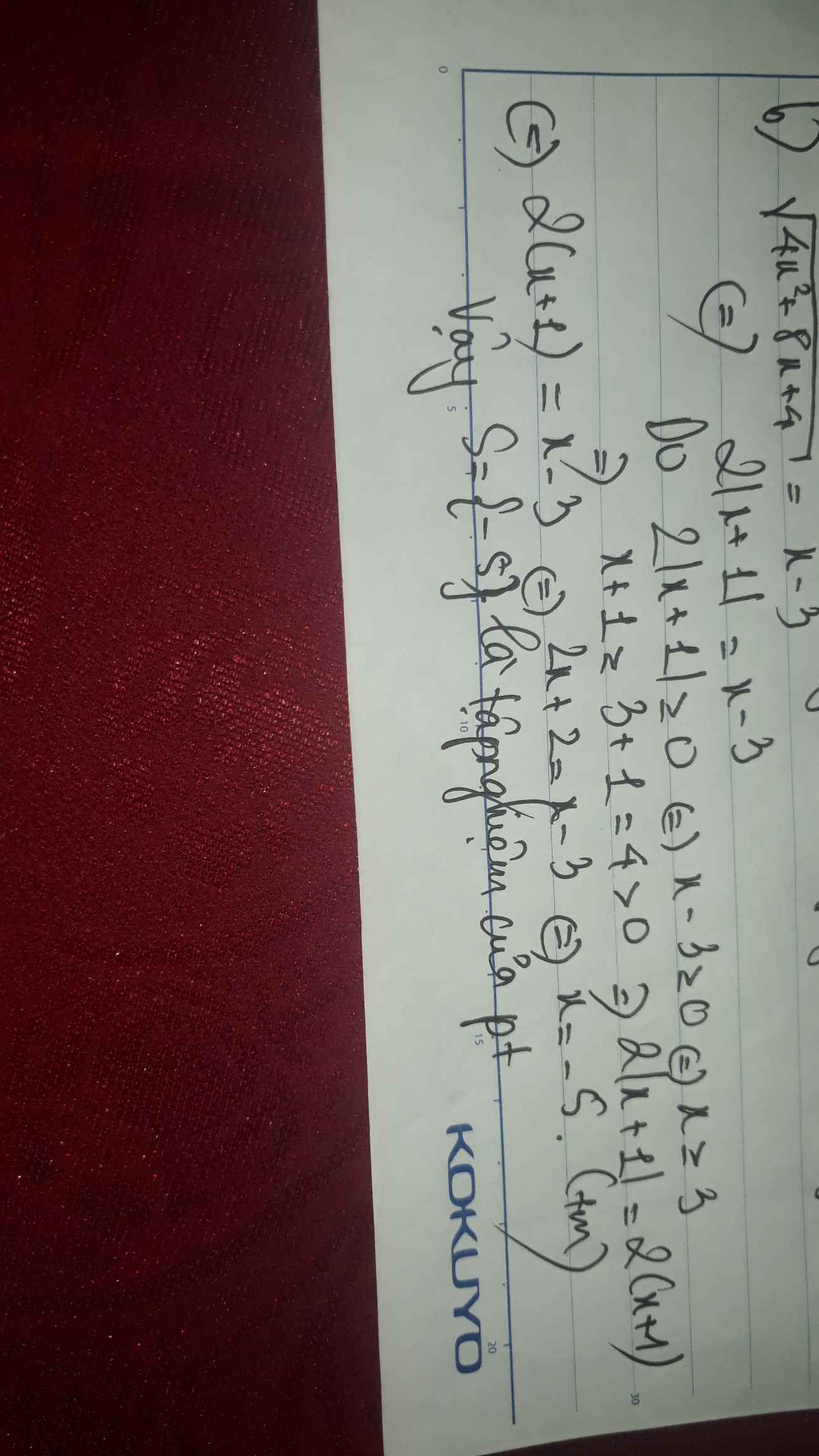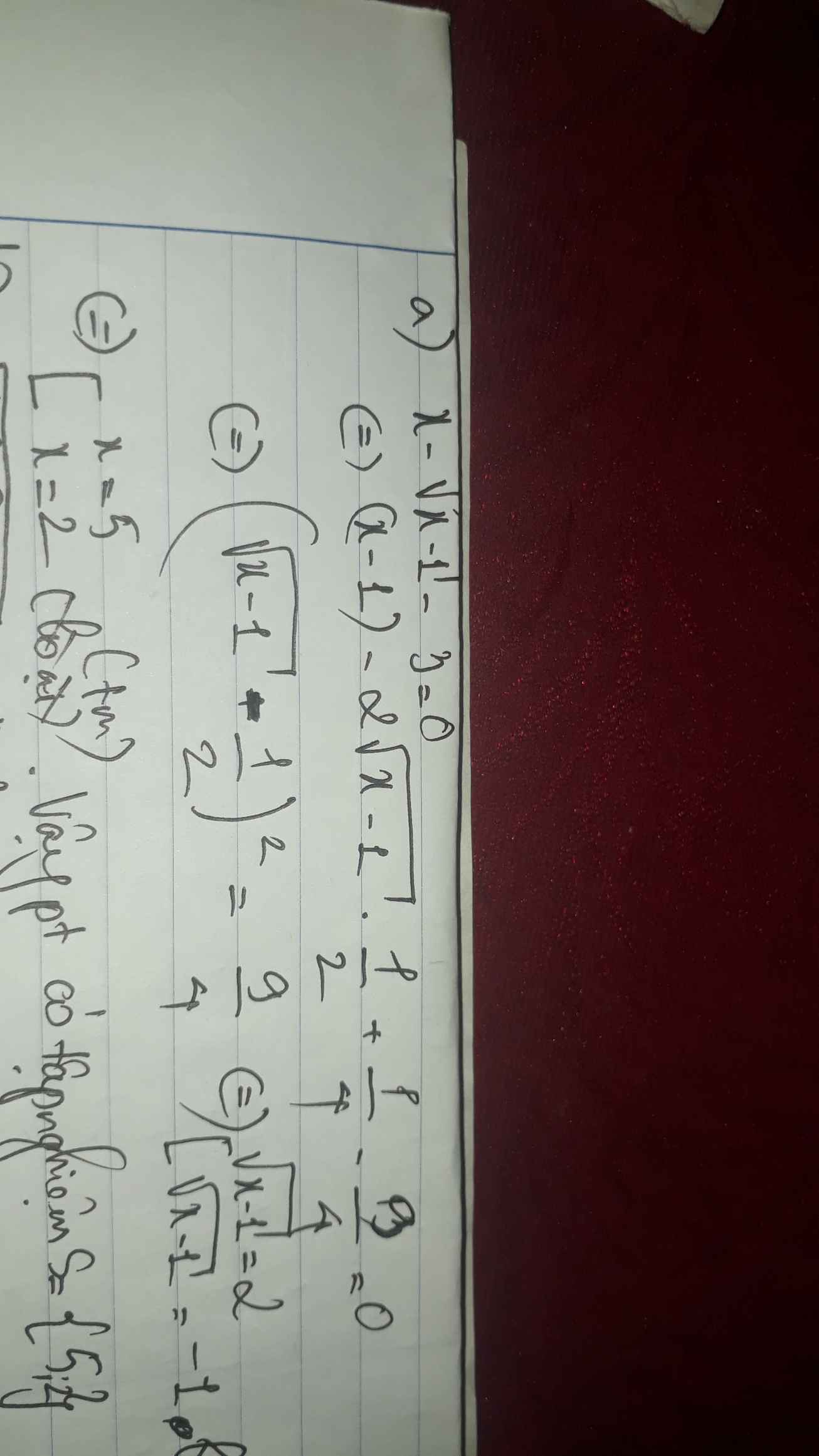Bài 4 (1 điểm). Giải phương trình $(x+5)\sqrt{2x+3}=-4{{x}^{2}}+2x+54.$
Hãy nhập câu hỏi của bạn vào đây, nếu là tài khoản VIP, bạn sẽ được ưu tiên trả lời.


\(1,\sqrt{x+2+4\sqrt{x-2}}=5\left(x\ge2\right)\\ \Leftrightarrow\sqrt{\left(\sqrt{x-2}+4\right)^2}=5\\ \Leftrightarrow\sqrt{x-2}+4=5\\ \Leftrightarrow\sqrt{x-2}=1\\ \Leftrightarrow x-2=1\Leftrightarrow x=3\\ 2,\sqrt{x+3+4\sqrt{x-1}}=2\left(x\ge1\right)\\ \Leftrightarrow\sqrt{\left(\sqrt{x-1}+4\right)^2}=2\\ \Leftrightarrow\sqrt{x-1}+4=2\\ \Leftrightarrow\sqrt{x-1}=-2\\ \Leftrightarrow x\in\varnothing\left(\sqrt{x-1}\ge0\right)\)
\(3,\sqrt{x+\sqrt{2x-1}}=\sqrt{2}\left(x\ge\dfrac{1}{2};x\ne1\right)\\ \Leftrightarrow x+\sqrt{2x-1}=2\\ \Leftrightarrow x-2=-\sqrt{2x-1}\\ \Leftrightarrow x^2-4x+4=2x-1\\ \Leftrightarrow x^2-6x+5=0\\ \Leftrightarrow\left(x-5\right)\left(x-1\right)=0\\ \Leftrightarrow\left[{}\begin{matrix}x=5\left(tm\right)\\x=1\left(loại\right)\end{matrix}\right.\)
\(4,\sqrt{x-2+\sqrt{2x-5}}=3\sqrt{2}\left(x\ge\dfrac{5}{2}\right)\\ \Leftrightarrow\sqrt{2x-4+2\sqrt{2x-5}}=6\\ \Leftrightarrow\sqrt{\left(\sqrt{2x-5}+1\right)^2}=6\\ \Leftrightarrow\sqrt{2x-5}+1=6\\ \Leftrightarrow\sqrt{2x-5}=5\\ \Leftrightarrow2x-5=25\Leftrightarrow x=15\left(TM\right)\)

b, \(đk:x\ge2\)
Xét x=2 thay vào pt thấy không thỏa mãn => x>2 hay 27x-54>0
\(x^3-11x+36x-18=4\sqrt[4]{27x-54}\)
\(\Leftrightarrow27x^3-297x^2+972x-486=4\sqrt[4]{\left(27x-54\right).81.81.81}\le189+27x\) (cosi với 4 số dương, dấu = xảy ra khi x=5)
\(\Leftrightarrow x^3-11x^2+35x-25\le0\)
\(\Leftrightarrow\left(x-1\right)\left(x-5\right)^2\le0\) (*)
Có \(\left\{{}\begin{matrix}x>2\\\left(x-5\right)^2\ge0\end{matrix}\right.\Rightarrow\left\{{}\begin{matrix}x-1>0\\\left(x-5\right)^2\ge0\end{matrix}\right.\)\(\Rightarrow\left(x-1\right)\left(x-5\right)^2\ge0\) (2*)
Từ (*) và (2*) ,dấu = xra khi x=5 (thỏa mãn)
Vây pt có nghiệm duy nhất x=5
c,Có \(6\sqrt[3]{4x^3+x}=16x^4+5>0\)
\(\Leftrightarrow4x^3+x>0\)
Có: \(16x^4+5=6\sqrt[3]{4x^3+x}\le2\left(4x^3+x+2\right)\) (theo cosi với 3 số dương,dấu = xảy ra khi \(x=\dfrac{1}{2}\))
\(\Leftrightarrow16x^4-8x^3-2x+1\le0\)
\(\Leftrightarrow\left(2x-1\right)^2\left(4x^2+2x+1\right)\le0\) (*)
(tương tự câu b) Dấu = xảy ra khi \(x=\dfrac{1}{2}\)(thỏa mãn)
Vậy....
d) Đk: \(x\ge\dfrac{3}{4}\)
Áp dụng bđt cosi:
\(\sqrt{2x-1}\le\dfrac{2x-1+1}{2}=x\)
\(\Rightarrow\dfrac{1}{\sqrt{2x-1}}\ge\dfrac{1}{x}\) (*)
\(\sqrt[4]{4x-3}\le\dfrac{4x-3+1+1+1}{4}=x\)
\(\dfrac{\Rightarrow1}{\sqrt[4]{4x-3}}\ge\dfrac{1}{x}\) (2*)
Từ (*) và (2*) \(\Rightarrow\dfrac{1}{\sqrt{2x-1}}+\dfrac{1}{\sqrt[4]{4x-3}}\ge\dfrac{2}{x}\)
Dấu = xảy ra khi x=1 (tm)

\(1,PT\Leftrightarrow2x-1=5\Leftrightarrow x=3\\ 2,\Leftrightarrow x-5=9\Leftrightarrow x=14\\ 3,ĐK:x\ge1\\ PT\Leftrightarrow3\sqrt{x-1}=21\Leftrightarrow\sqrt{x-1}=7\Leftrightarrow x=50\left(tm\right)\\ 4,\Leftrightarrow x=\dfrac{\sqrt{50}}{\sqrt{2}}=\dfrac{5\sqrt{2}}{\sqrt{2}}=5\)

a) \(3x-2\sqrt{x-1}=4\) (ĐK: x ≥ 1)
\(\Rightarrow3x-2\sqrt{x-1}-4=0\)
\(\Rightarrow3x-6-2\sqrt{x-1}+2=0\)
\(\Rightarrow3\left(x-2\right)-2\left(\sqrt{x-1}-1\right)=0\)
\(\Rightarrow3\left(x-2\right)-2.\dfrac{x-2}{\sqrt{x-1}+1}=0\)
\(\Rightarrow\left(x-2\right)\left[3-\dfrac{2}{\sqrt{x-1}+1}\right]=0\)
*TH1: x = 2 (t/m)
*TH2: \(3-\dfrac{2}{\sqrt{x-1}+1}=0\)
\(\Rightarrow3=\dfrac{2}{\sqrt{x-1}+1}\)
\(\Rightarrow3\sqrt{x-1}+3=2\)
\(\Rightarrow3\sqrt{x-1}=-1\) (vô lí)
Vậy S = {2}
b) \(\sqrt{4x+1}-\sqrt{x+2}=\sqrt{3-x}\) (ĐK: \(-\dfrac{1}{4}\le x\le3\) )
\(\Rightarrow\sqrt{4x+1}-3-\sqrt{x+2}+2-\sqrt{3-x}+1=0\)
\(\Rightarrow\dfrac{4x-8}{\sqrt{4x+1}+3}-\dfrac{x-2}{\sqrt{x+2}+2}+\dfrac{x-2}{\sqrt{3-x}+1}=0\)
\(\Rightarrow\left(x-2\right)\left(\dfrac{4}{\sqrt{4x+1}+3}-\dfrac{1}{\sqrt{x+2}+2}+\dfrac{1}{\sqrt{3-x}+1}\right)=0\)
=> x = 2
\(a,3x-2\sqrt{x-1}=4\left(x\ge1\right)\\ \Leftrightarrow-2\sqrt{x-1}=4-3x\\ \Leftrightarrow4\left(x-1\right)=16-24x+9x^2\\ \Leftrightarrow9x^2-28x+20=0\\ \Leftrightarrow\left(x-2\right)\left(9x-10\right)=0\\ \Leftrightarrow\left[{}\begin{matrix}x=2\left(tm\right)\\x=\dfrac{10}{9}\left(tm\right)\end{matrix}\right.\)
\(b,\sqrt{4x+1}-\sqrt{x+2}=\sqrt{3-x}\left(-\dfrac{1}{4}\le x\le3\right)\\ \Leftrightarrow4x+1+x+2-2\sqrt{\left(4x+1\right)\left(x+2\right)}=3-x\\ \Leftrightarrow-2\sqrt{\left(4x+1\right)\left(x+2\right)}=2-6x\\ \Leftrightarrow\sqrt{4x^2+9x+2}=3x-1\\ \Leftrightarrow4x^2+9x+2=9x^2-6x+1\\ \Leftrightarrow5x^2-15x-1=0\\ \Leftrightarrow\Delta=225+20=245\\ \Leftrightarrow\left[{}\begin{matrix}x=\dfrac{15-\sqrt{245}}{10}=\dfrac{15-7\sqrt{5}}{10}\left(ktm\right)\\x=\dfrac{15+\sqrt{245}}{10}=\dfrac{15+7\sqrt{5}}{10}\left(tm\right)\end{matrix}\right.\Leftrightarrow x=\dfrac{15+7\sqrt{5}}{10}\)

a.
ĐKXĐ: \(x\ge0\)
\(\sqrt{2x^2+13x+5}-5\sqrt{x}+\sqrt{2x^2-3x+5}-3\sqrt{x}=0\)
\(\Leftrightarrow\dfrac{2x^2-12x+5}{\sqrt{2x^2+13x+5}+5\sqrt{x}}+\dfrac{2x^2-12x+5}{\sqrt{2x^2-3x+5}+3\sqrt{x}}=0\)
\(\Leftrightarrow\left(2x^2-12x+5\right)\left(\dfrac{1}{\sqrt{2x^2+13x+5}+5\sqrt{x}}+\dfrac{1}{\sqrt{2x^2-3x+5}+3\sqrt{x}}\right)=0\)
\(\Leftrightarrow2x^2-12x+5=0\)
\(\Leftrightarrow...\)
b.
ĐKXĐ: \(x^2\ge\dfrac{4}{3}\)
\(\sqrt{x^2-\dfrac{4}{3}}+\sqrt{4x^2-4}-x=0\)
\(\Leftrightarrow\sqrt{\dfrac{3x^2-4}{3}}+\dfrac{3x^2-4}{\sqrt{4x^2-4}+x}=0\)
\(\Leftrightarrow\sqrt{3x^2-4}\left(\dfrac{1}{\sqrt{3}}+\dfrac{\sqrt{3x^2-4}}{\sqrt{4x^2-4}+x}\right)=0\)
\(\Leftrightarrow3x^2-4=0\)
\(\Leftrightarrow...\)

Bài 1:
a) (5x-4)(4x+6)=0
\(\Leftrightarrow\orbr{\begin{cases}5x-4=0\\4x+6=0\end{cases}\Leftrightarrow\orbr{\begin{cases}5x=4\\4x=-6\end{cases}\Leftrightarrow}\orbr{\begin{cases}x=\frac{4}{5}\\y=\frac{-3}{2}\end{cases}}}\)
b) (x-5)(3-2x)(3x+4)=0
<=> x-5=0 hoặc 3-2x=0 hoặc 3x+4=0
<=> x=5 hoặc x=\(\frac{3}{2}\)hoặc x=\(\frac{-4}{3}\)
c) (2x+1)(x2+2)=0
=> 2x+1=0 (vì x2+2>0)
=> x=\(\frac{-1}{2}\)
bài 1:
a) (5x - 4)(4x + 6) = 0
<=> 5x - 4 = 0 hoặc 4x + 6 = 0
<=> 5x = 0 + 4 hoặc 4x = 0 - 6
<=> 5x = 4 hoặc 4x = -6
<=> x = 4/5 hoặc x = -6/4 = -3/2
b) (x - 5)(3 - 2x)(3x + 4) = 0
<=> x - 5 = 0 hoặc 3 - 2x = 0 hoặc 3x + 4 = 0
<=> x = 0 + 5 hoặc -2x = 0 - 3 hoặc 3x = 0 - 4
<=> x = 5 hoặc -2x = -3 hoặc 3x = -4
<=> x = 5 hoặc x = 3/2 hoặc x = 4/3
c) (2x + 1)(x^2 + 2) = 0
vì x^2 + 2 > 0 nên:
<=> 2x + 1 = 0
<=> 2x = 0 - 1
<=> 2x = -1
<=> x = -1/2
bài 2:
a) (2x + 7)^2 = 9(x + 2)^2
<=> 4x^2 + 28x + 49 = 9x^2 + 36x + 36
<=> 4x^2 + 28x + 49 - 9x^2 - 36x - 36 = 0
<=> -5x^2 - 8x + 13 = 0
<=> (-5x - 13)(x - 1) = 0
<=> 5x + 13 = 0 hoặc x - 1 = 0
<=> 5x = 0 - 13 hoặc x = 0 + 1
<=> 5x = -13 hoặc x = 1
<=> x = -13/5 hoặc x = 1
b) (x^2 - 1)(x + 2)(x - 3) = (x - 1)(x^2 - 4)(x + 5)
<=> x^4 - x^3 - 7x^2 + x + 6 = x^4 + 4x^3 - 9x^2 - 16x + 20
<=> x^4 - x^3 - 7x^2 + x + 6 - x^4 - 4x^3 + 9x^2 + 16x - 20 = 0
<=> -5x^3 - 2x^2 + 17x - 14 = 0
<=> (-x + 1)(x + 2)(5x - 7) = 0
<=> x - 1 = 0 hoặc x + 2 = 0 hoặc 5x - 7 = 0
<=> x = 0 + 1 hoặc x = 0 - 2 hoặc 5x = 0 + 7
<=> x = 1 hoặc x = -2 hoặc 5x = 7
<=> x = 1 hoặc x = -2 hoặc x = 7/5

Do \(x^6-x^3+x^2-x+1=\left(x^3-\dfrac{1}{2}\right)^2+\left(x-\dfrac{1}{2}\right)^2+\dfrac{1}{2}>0\) ; \(\forall x\) nên BPT tương đương:
\(\sqrt{13}-\sqrt{2x^2-2x+5}-\sqrt{2x^2-4x+4}\ge0\)
\(\Leftrightarrow\sqrt{4x^2-4x+10}+\sqrt{4x^2-8x+8}\le\sqrt{26}\) (1)
Ta có:
\(VT=\sqrt{\left(2x-1\right)^2+3^2}+\sqrt{\left(2-2x\right)^2+2^2}\ge\sqrt{\left(2x-1+2-2x\right)^2+\left(3+2\right)^2}=\sqrt{26}\) (2)
\(\Rightarrow\left(1\right);\left(2\right)\Rightarrow\sqrt{4x^2-4x+10}+\sqrt{4x^2-8x+8}=\sqrt{26}\)
Dấu "=" xảy ra khi và chỉ khi \(2\left(2x-1\right)=3\left(2-2x\right)\Leftrightarrow x=\dfrac{4}{5}\)
Vậy BPT có nghiệm duy nhất \(x=\dfrac{4}{5}\)


Sqrt5/2-x=4 với x bé hơn hoặc bằng 5/2